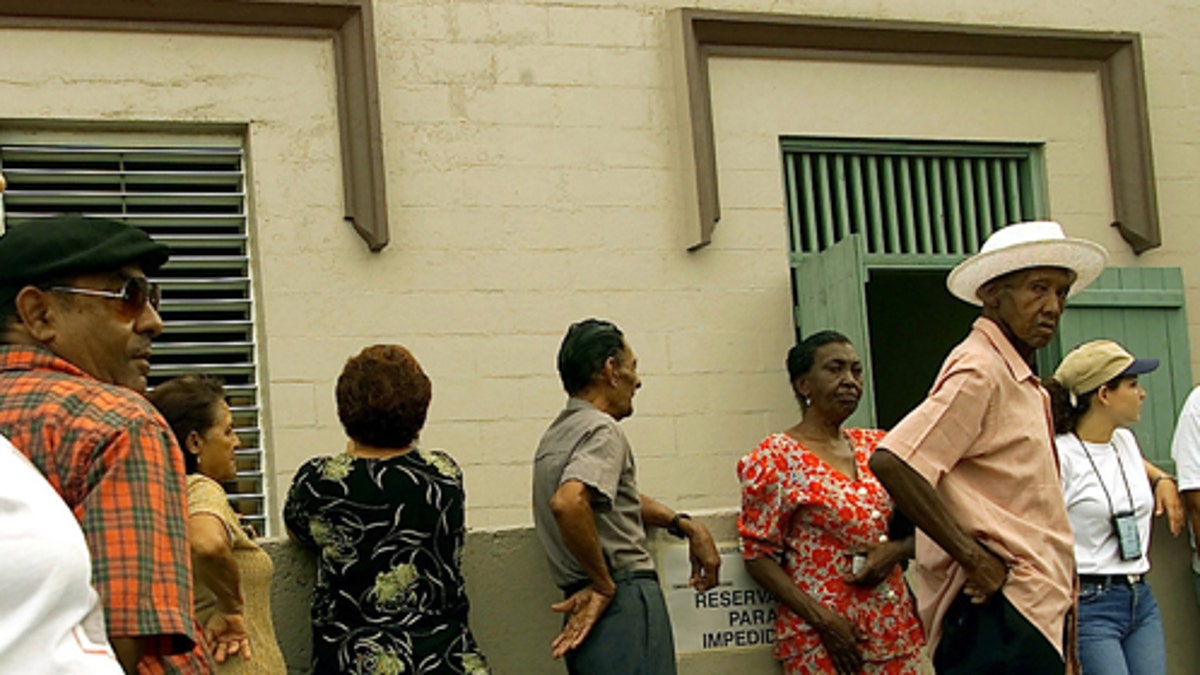
392573 03: (Puerto Rico Out) Vieques Residents Line Up At Polling Stations To Cast Their Vote In A Non- Binding Referendum Over The Future Of Navy Bombing Exercises July 29, 2001 On The Island Of Vieques. Puerto Rico. Option Two Calls For The Immediate And Permanent Termination Of Military Exercises Plus The Cleaning And Return Of Vieques Land To Its Citizens. (Photo By Jose Jimenez/Primera Hora/Getty Images) ((Photo By Jose Jimenez/Primera Hora/Getty Images))
SAN JUAN, Puerto Rico – After the more than 800,000 votes, Puerto Rico on Sunday rejected constitutional amendments that would have reduced the size of the legislature and given judges the right to deny bail in certain murder cases.
The referendum's result mean Puerto Rico remains the only place in the Western Hemisphere where everyone is entitled to bail regardless of the alleged crime.
With 99 percent of polling places reporting, officials said 54 percent of the 805,337 votes counted rejected the legislative measure and 46 percent favored it. Fifty-five percent opposed the bail measure and 45 percent supported it.
I came to vote because they killed my only son six months ago.
"It is a time to celebrate because the people have saved our constitution and our rights," said Arturo Hernández, gubernatorial candidate for the Sovereign Union Movement, one of the island's minority parties.
Gov. Luis Fortuño and other members of his pro-statehood party lamented the bail change wasn't approved.
"This would have been a great tool to fight crime," Fortuño said as he thanked the families of victims who supported the measure.
The island of nearly 4 million people reported a record 1,117 homicides last year, and the drug-fueled violence continues unabated, with an increasing number of innocent bystanders being killed.
Senate President Thomas Rivera Schatz said he accepted the defeat but added that he doesn't regret supporting the proposed amendments.
"We defended our principles," he said.
Fortuño's campaign director, Angel Cintron, also accepted the preliminary results.
"It's not what we expected," he said. "It differs from our projection and we have to recognize that."
The bail amendment would have granted judges the right to deny bail to those accused of premeditated murder, killing a police officer or killing someone in a public space or during a home invasion, sexual assault or drive-by shooting.
The legislative amendment would have reduced the number of Senate seats from 27 to 17 and the number of House seats from 51 to 39.
Supporters of amending the constitution argued the bail changes would cut crime and said the legislature reduction would make the body more efficient as well as save money that politicians pledged would be used to fight crime.
"This is one of the most important referendums in many years," said Alexandra Beltran, a San Juan resident who voted in the upscale neighborhood of Ocean Park accompanied by her husband and young daughter. "I believe it's time we do something to intimidate criminals."
Hundreds of thousands of voters walked, drove, cycled, skateboarded and used wheelchairs to get to polling stations across Puerto Rico on Sunday and stood in long lines, sometimes under a brutal sun.
At polling stations in the impoverished seaside town of Loiza, some voters decried the wave of violence that has hit their town especially hard.
"I came to vote because they killed my only son six months ago," Aurea Elicea said as she wiped away tears.
Limiting bail would prevent suspects from intimidating witnesses and killing again while out on bail, she said, adding that her son's killer hasn't been arrested.
"That is why people don't testify," she said.
The referendum came just weeks after federal prosecutors charged a man with murder and held him two weeks without bail only to release him after saying they had the wrong person.
It was a case still fresh in the minds of voters like Daisa Rivera, 30, who said there should always be a presumption of innocence.
Rivera also she said she didn't believe the money saved from shrinking the legislature would be put to good use, but others expressed anger that Puerto Rico's legislature is among the highest paid of any U.S. jurisdiction and that a number of corruption cases have surfaced in recent years.
"Everyone knows they are stealing a lot and they are making a lot of money," said 59-year-old Jose Calderón, who voted in support of the proposed changes.
It was the second time Puerto Ricans have said no to changing the right to bail. Fifty-four percent of voters in a 1994 referendum rejected a proposal that would have allowed judges to withhold bail in any case, regardless of the crime charged.
Written and reported by the Associated Press.
Follow us on twitter.com/foxnewslatino
Like us at facebook.com/foxnewslatino




